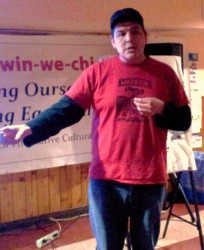Article Origin
Volume
Issue
Year
Colonization has interfered with the traditional roles of Indigenous men, Giibwanisi told people gathered on March 5 for a discussion on men’s obligations. The discussion was part of a speaker series titled Community Resurgence, hosted by Ryerson University’s Centre for Indigenous Governance and Ryerson’s Aboriginal Education Council.
“When I first understood what colonization was, I was really angry and just wanted to rage,” said Giibwanisi, one of the evening’s two speakers. A member of Beausoleil First Nation, he’s an activist and co-founder of Oshkimaadziig Unity Camp. The Camp, located in Awenda Provincial Park two hours north of Toronto, is a land occupation and cultural revitalization project founded two years ago.
Giibwanisi’s anger took him on a journey to learn about the culture. He calls his process of decolonization biskaabiiyang, the Ojibway word for returning.
“What are we returning to? We are returning to a way of life that was taken from us,” he said.
Giibwanisi recalls one of the first things Cree Elder Vern Harper said to him.
“Drugs and alcohol have no business in our way of life.”
Giibwanisi sobered up, started to learn and changed his life.
He’s learned that Indigenous men have four roles – firekeepers, warriors, providers and teachers. Of relationships between men and women, he says, “There’s supposed to be a balance. The way that I look at it is that the Sacred Pipe, there’s the bowl and there’s the stem…the bowl represents the woman and the medicines and the fire that’s inside it… Women carry that fire of life and it’s the man who has to protect that…and it’s not complete until you put the two together.”
“We’re warriors,” he said, and that comes with responsibilities “to defend and to protect a way of life, to protect the people.” That includes stopping violence against women, Giibwanisi said. He quoted Shawn Brant of Tyendinaga as saying men have failed to protect the women, and evidence of this can be seen in the issue of missing and murdered women.
To fulfill the warrior role means to understand the Seven Grandfathers teaching about bravery Giibwanisi said. “You have to put yourself in a position to be hurt, to be uncomfortable, to be challenged.”
Another role of Indigenous men is to be a provider. “We have to hunt. We have to fish,” he said. “But there’s a lot of legislation that’s been passed or being passed that prevents us from doing these things.”
He spoke about his family, and his young nieces in particular, and his responsibility to “impart knowledge to them about how a man is supposed to be so that when they grow up they know what to expect.” That’s another responsibility of men, he said, to make sure teachings are passed on about the roles of men and women.
Rick Monture was the second speaker. He is a Mohawk historian and director of the Indigenous Studies Program at McMaster University. Monture is from Six Nations of the Grand River and came from a family where men were ironworkers and the women were teachers.
When he went to university, he felt “it wasn’t a man’s kind of thing to do.” He came to realize, particularly after he started teaching at McMaster, that he was fulfilling his designated role in life. Through his work, he is helping to keep the culture and traditions alive. Monture said he’s able to be a better teacher because he’s not just teaching from textbooks, but from his own life experiences.
“We all have our roles and responsibilities to fulfill,” he said, and talked about the need to give thanks daily for the elements in the natural world that carry out their responsibilities so humans can continue to survive.
The world was created with balance, Monture said, and he spoke about the male-female pairings, “Grandmother Moon and Elder Brother the Sun, woman and man.
“Creator’s a male entity. Mother Earth. We have the Thunders, Grandfathers that protect us. Also, the stars are female. The stars are the helpers of the moon as well. All these things happen in pairs, and male and female principles in powers,” he said.
All these natural forces have family relationships, Monture told the audience, and it should make us think about our own families and our roles to help and protect each other.
Photo caption: Giibwanisi speaking in Toronto about the roles of Indigenous men at Community Resurgence speaker series March 5.
- 19963 views

